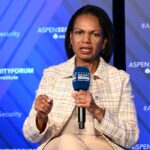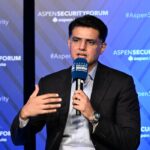The 2025 Aspen Security Forum
July 15-18 | Aspen, CO
The 2025 Aspen Security Forum continued yesterday in Aspen, CO! We are pleased to share some of the highlights from our third day below.
Tune in to today‘s sessions by joining our livestream!
Day Three Highlights
Fireside Chat with Special Envoy Adam Boehler 
Adam Boehler
Special Presidential Envoy for Hostage Response, U.S. Department of State
Moderator
Kaitlan Collins
CNN
“The way I think of myself is, I have a mission. We’ve got about 50-60 more Americans. I will continue to do it until there are none.” – Adam Boehler
Adam Boehler discussed his role as Special Envoy for Hostage Response, including his approach to negotiations, the value of action-oriented responses, and his experiences in the Middle East.
Watch here.
Frontlines and Fault Lines: Russia, Ukraine, and Beyond
In Partnership with the Josef Korbel School of Global and Public Affairs

Condoleezza Rice
Co-Chair, Aspen Strategy Group
Tad and Dianne Taube Director and Thomas and Barbara Stephenson Senior Fellow on Public Policy, Hoover Institution, Stanford University
66th U.S. Secretary of State, U.S. Department of State
Pasi Rajala
Political State Secretary to the Minister for Foreign Affairs
and the Minister of Defence, Finland
Halyna Yanchenko
Member, Supreme Council of Ukraine
Head of Investment Taskforce for Defense Industry
Susan Glasser
Staff Writer and Columnist, The New Yorker
Moderator
Andrea Mitchell
NBC News
“Vladimir Putin will not be stopped with words. He will only be stopped if he believes he can go no further…But without continually arming the Ukrainian people, without showing [him] that you’re not going to leave Ukraine exposed, I think he will keep going. So my answer to how you stop him is that you show strength, you show resolve, and you back Ukraine.” – Condoleezza Rice
This session focused on the future of the Russia-Ukraine war, including Putin’s motivations, the current state of the conflict, and the potential for an end to the war.
Watch here.
India’s Geopolitical Moment?

Shaurya Doval
Member Governing Council, India Foundation
Šumit Ganguly
Director, Huntington Program on Strengthening U.S.-India Relations, Hoover Institution, Stanford University
Sachin Pilot
Former Minister, Corporate Affairs, Telecom & Information Technology, Government of India; General Secretary, Indian National Congress
Moderator
Edward Luce
Financial Times
“There is a bipartisan consensus both in India and here in the United States that this relationship is of significance. There will be hiccups in two democratic countries, administrations will change…so there will be an ebb and flow. But I cannot see the relationship plummeting.” – Šumit Ganguly
The panelists explored India’s perspective on the current state of geopolitics, including its bilateral relationship with the U.S., its stance towards China, and its regional and global role.
Watch here.
Cracking the Code: AI and National Security

Charlie Dent
Executive Director and Vice President, Congressional Program, Aspen Institute; Former Member of Congress (R) PA-15
Tarun Chhabra
Head of National Security, Anthropic; Distinguished Visiting Fellow, Hoover Institution, Stanford University; Former National Security Council Coordinator for Technology and National Security
Katrina Mulligan
OpenAI for Government, OpenAI
Moderator
Kaitlan Collins
CNN
“This is the first time in American history that a technology of this consequence is being developed exclusively by the private sector.” – Katrina Mulligan
The panelists discussed how to balance the promise and perils of AI, exploring its political, economic, and societal implications.
Watch here.
A Turning Point for Tehran?

Stephen Hadley
Founding Principal, Rice, Hadley, Gates & Manuel LLC
Former U.S. National Security Advisor
Rachel Bronson
Senior Advisor, Bulletin of the Atomic Scientists
Vali Nasr
Majid Khadduri Professor of Middle East Studies and International Affairs, School of Advanced International Studies, Johns Hopkins University
David Sanger
White House and National Security Correspondent, The New York Times
Moderator
Dafna Linzer
U.S. News and World Report
“It’s that collapse of the JCPOA, I believe, that leads us straight to a military response today. Once the United States pulled out of that agreement, which we all would say was flawed in part…there was almost no other choice if the Iranians wanted to continue to pursue their program, which they demonstrated that they wanted to do.” – Rachel Bronson
This panel focused on the path ahead for Iran, touching upon the recent strikes from the U.S. and Israel, Iran’s potential responses, its nuclear ambitions, the possibility of regime change, its role in the region, and more.
Watch here.
The International Economy and the Art of the (Trade) Deal

Jonathan Black
Deputy National Security Advisor, Cabinet Office, United Kingdom
Penny Pritzker
Chairman, PSP Partners; 38th U.S. Secretary of Commerce
Robert Zoellick
Chairman, Temasek Americas; Former President, World Bank;
Former U.S. Trade Representative
David Sanger
White House and National Security Correspondent, The New York Times
Moderator
Edward Luce
Financial Times
“It’s a big deal that you’ve now had two presidents of two different parties take a protectionist line. That is a very big switch in the nature of trade politics.” – Robert Zoellick
This session delved into the impact of the new U.S. administration’s trade policies on international economics and politics, exploring the rise of protectionism, the effects on America’s partnerships, global economic uncertainty, and more.
Watch here.





